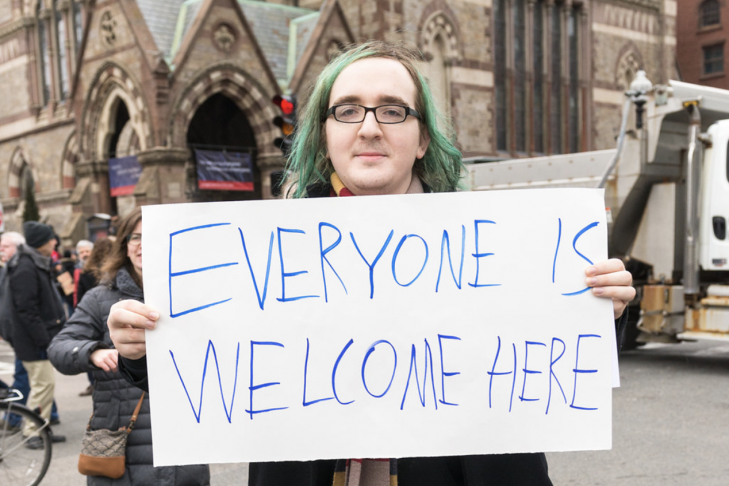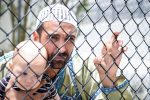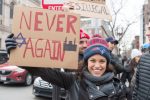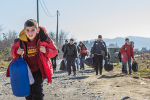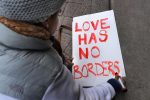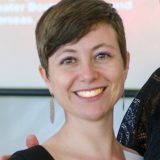Last Friday, on International Holocaust Remembrance Day, a day in which we reflect on our collective loss and our communal mandate to ensure that the oppressed are safe from harm, President Donald Trump signed an anti-immigrant, anti-refugee executive order.
In the whirlwind of the past few days, it was easy to miss the details: The order suspended all refugee entry for 120 days and barred all Syrian refugees from entering the United States. It also blocked citizens of seven Muslim-majority countries from entering the United States for 90 days: Somalia, Sudan, Syria, Iran, Iraq, Libya and Yemen.
This includes permanent U.S. residents (green-card holders) who were overseas to visit family or to work. Plus, the order targets individuals who hold dual citizenship with one of those seven countries and another country (for example, someone with both Canadian and Sudanese citizenships).
Bear with me for some more important details: Technically, on paper, this isn’t a Muslim ban. But a Muslim ban is what this amounts to. During Trump’s campaign he promised to temporarily ban all Muslims from entering the U.S. That morphed into “extreme vetting,” which turned into Friday’s order.
All of this is occurring at a moment when massive humanitarian crises are happening around the world.
And now for some details proponents of the order really hope you’ll ignore: People from the seven countries in Trump’s executive order have killed zero people in terrorist attacks in the U.S. between 1975 and 2015. That includes the 9/11 attack. And in the last 40 years, only 20 out of over 3.25 million refugees in the U.S. have been convicted of attempting or carrying out terrorism in America. And only three Americans were killed in refugee attacks—all by refugees from Cuba in the 1970s.
None of the countries with majority predominantly Muslim populations in which President Trump has business interests are on the list, and the administration mandates that Christian immigrants be prioritized.
The administration also announced plans to target sanctuary cities and publish lists of crimes committed by undocumented immigrants. They have said they will force Muslims to register.
The Washington-based research organization New America Foundation did a review of U.S. “terror” attacks since 9/11 and found that most of them were carried out by radical anti-government groups or white supremacists, which puts into stark perspective the fact that Steve Bannon, senior counselor to the president, has been shown to have significant ties to white supremacists and neo-Nazis.
At the same time, the administration has made the media an enemy and done its best to discredit those disseminating the facts—a tactic historians say is a telltale sign of fascism at play.
Jews have seen this before.
We know the devastating impact any religiously based persecution and discrimination will have. We know what happens when “alternative facts” are disseminated by those in power and then consumed by the masses. We know what happens when seemingly good citizens stand by as their neighbors’ rights are eroded bit by bit.
I have heard people in the Boston Jewish community say that standing up to and speaking out about Trump’s actions means taking a partisan stance, that we are a diverse community that includes members from all across the political spectrum. But this discriminatory ban and the misinformation being spread are not partisan issues. These are issues of health, freedom and justice. They are issues of common humanity.
A Desmond Tutu quote keeps running through my mind: “If you are neutral in situations of injustice, you have chosen the side of the oppressor.”
So on Sunday, after a week of executive orders and proclamations targeting not only immigrants and refugees but also the poor, women, people of color and the environment, I joined thousands of people to protest the immigrant and refugee ban, the ongoing messages of hate, and the intentional gas-lighting being perpetrated by the highest level of our government. The rally was inspiring and it reinforced my belief in the power of solidarity and love.
The front of CJP’s office is inscribed with three words: rachamim (compassion), hayyim (life) and shalom (peace). They reinforce a mandate we as Jews have to take a stand against hate and discrimination.
It is our responsibility to take action in whatever way we can. To show up to rallies. To call our elected officials. To make monthly donations to causes we care about. To volunteer for organizations working for justice. And to teach our children to do the same.
Our faith and our communal experience of oppression dictate that we must not stand idly by while our neighbors suffer.
We are blessed to live in a time and in a place where we can still raise our individual and communal voices to make change and do good.
I hope you will join me.
“you have to understand,
that no one puts their children in a boat
unless the water is safer than the land”
—From “Home” by Warsan Shire
This post has been contributed by a third party. The opinions, facts and any media content are presented solely by the author, and JewishBoston assumes no responsibility for them. Want to add your voice to the conversation? Publish your own post here. MORE


